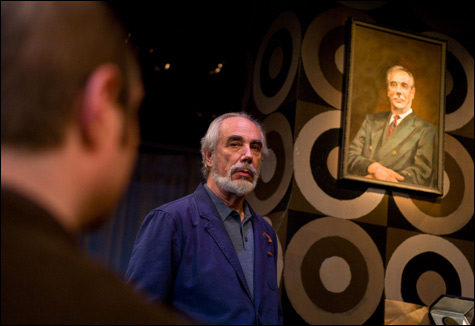
SURPRISE! And then another, and another, and another . . . |
Enigma Variations isn’t very good, but I can’t tell you why. Eric-Emmanuel Schmitt’s 1996 two-hander (in the original, Variations Énigmatiques), which is in its area premiere at Gloucester Stage (through July 13), is, like Anthony Shaffer’s superior Sleuth, a play that turns on twist after twist, in this case to the point where it becomes either tiresome or laughable depending on your mood. The first revelation comes about a third of the way into the hour-and-three-quarters work, so Schmitt’s contrivances beyond that point cannot be pooh-poohed without ruining his surprises. Suffice to report that, toward the end, one of the two characters appeared absolutely astonished when the other, having made his exit, returned and their melodramatic cat-and-mouse conversation continued. I felt the same way.
The play takes its name from Sir Edward Elgar’s 1899 composition of the same name: 14 variations on a theme that’s never quite discerned. A rumination on the elusive nature of intimacy and love, Schmitt’s Enigma Variations starts out as something other than what it proves to be (though both pretense and actuality are pretty implausible). A Nobel Prize winning author of 21 novels who lives in seclusion on an Arctic island high up in the Norwegian Sea has granted an interview to a small-town journalist. Abel Znorko has just published a book quite different from his previous, more philosophical novels, and Erik Larsen, who arrives with a non-functioning tape recorder and more knowledge of his quarry that might likely be garnered from the public record, is convinced it’s not a work of fiction. For the first half-hour, he tries to get the pretentious and insulting Znorko to own up to this. Turns out he’s after more than just a scoop for his local rag.

Dedicated (as is each of Elgar’s Enigma Variations) to an individual identified only by initials, the book that so interests Larsen is a series of love letters between a man the novelist calls Abel Znorko and a woman he calls Eva L’Amour whom Znorko at first insists he made up, along with her beautifully concocted letters. We learn, however, that both men have known the same woman in different contexts: she is the enigma of this Enigma Variations, a turgid if explosive encounter that asks whether one can ever really know one’s beloved and whether any of us is indeed a single self to be comprehended. Also on the table are the writer’s need to control the narrative of his life and the strange ways in which we contrive to hold onto what’s lost. But the play goes on and on, dropping emotional bombshell after emotional bombshell until, by the end (that is, the final end, not to be confused with the several false endings), the situation is not only tearful but a little kinky. The play’s portentous language, too, is clichéd; it’s difficult to know whether to blame Schmitt or his English translator, the well-reputed Jeremy Sams.
Gloucester Stage cannot be blamed, except for the choice of the play. (Those small-cast, one-set dramas can be seductive.) Given the theater’s budget constraints, set and lighting designers Jenna McFarland Lord and Russ Swift can make only a rudimentary suggestion of the oceanic isolation and autumnal twilight proposed by the script (though there is an eerie fade, along with some ghostly sound, in the closing moments). David Zoffoli is at the helm of the adequate production, which thrashes somewhat more than it needs to, especially when it comes to the interaction of Larsen and his overcoat. But David Volin reconciles the interrogator’s cunning with the desperation of the far-from-objective visitor he turns out to be. And it’s clear that Tom Markus, who has played Znorko is several productions of the play (and directed one), is at home with the Great Writer’s exterior smugness and inner terror. Still, there are just so many variations on a twist that two actors can pull off.